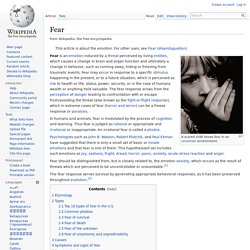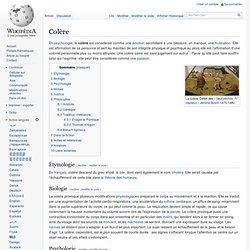

Queen_of_hatred_by_dietermiller-d3bvlyk.jpg. Hatred. Hatred (or hate) is a deep and emotional extreme dislike that can be directed against individuals, entities, objects, or ideas.

Hatred is often associated with feelings of anger and a disposition towards hostility. Commonly held moral rules, such as the Golden Rule, oppose universal hatred towards another. The Bible[edit] Both the Old and the New Testaments deal with hatred. Ecclesiastes 3:8 teaches that there is a "time to love, and a time to hate;".[1] However, the Old Testament (also known as the Jewish bible, the Tanakh) also contains condemnations of hatred. It is popularly assumed that one can’t “hate” and “love” the same person at the same time. Today’s popular characterization of good hatred is to “hate the sin, but love the sinner”. Haine. Un article de Wikipédia, l'encyclopédie libre.

La haine est une hostilité très profonde, une exécration et une aversion intenses envers quelqu'un ou quelque chose[1]. Calculée, froide et systématique, la haine se distingue de la simple inimitié, plus spontanée, impulsive et affective. Définitions[modifier | modifier le code] Le philosophe espagnol José Ortega y Gasset définit la nature de la haine : « Haïr, c'est tuer virtuellement, détruire en intention, supprimer le droit de vivre. Haïr quelqu'un, c'est ressentir de l'irritation du seul fait de son existence, c'est vouloir sa disparition radicale. » Il précise ses modalités : « La haine sécrète un suc virulent et corrosif. [...] Alain Finkielkraut affirme que la haine est pire encore que l'intolérance à la diversité : elle « manifeste l'intolérance du moi devant sa propre responsabilité »[3]. Saverio Tomasella confirme l'ensemble de ces constats cliniques.
Peur. Phobie. Un article de Wikipédia, l'encyclopédie libre.

Le terme phobie, du grec ancien phobos (φόβος), frayeur[1] ou crainte[2]. désigne dans la langue courante une peur démesurée d'un objet ou d'une situation précise, par exemple l'acrophobie (phobie des hauteurs), l'herpétophobie (peur des serpents et autres reptiles), l'arachnophobie (peur des araignées) ou la phobie du téléphone. En psychanalyse et psychiatrie le terme désigne une crainte déraisonnable dont la personne reconnait le caractère injustifié et dont elle souffre[2]. Les phobies en psychologie[modifier | modifier le code] Les phobies se présentent de manière différente chez l'enfant où elles sont souvent sans conséquence[réf. nécessaire], ou chez l'adolescent et l'adulte. Lorsqu'elles prennent valeur de symptômes, elles doivent être appréciées comme un signe d'une souffrance psychique.
Fear. A scared child shows fear in an uncertain environment.

In humans and animals, fear is modulated by the process of cognition and learning. Thus fear is judged as rational or appropriate and irrational or inappropriate. An irrational fear is called a phobia. Fear should be distinguished from, but is closely related to, the emotion anxiety, which occurs as the result of threats which are perceived to be uncontrollable or unavoidable.[1] The fear response serves survival by generating appropriate behavioral responses, as it has been preserved throughout evolution.[2] Colère. Un article de Wikipédia, l'encyclopédie libre.

Étymologie[modifier | modifier le code] En français, colère descend du grec kholê, la bile, dont vient également le nom choléra. Elle serait causée par l'échauffement de cette bile dans la théorie des humeurs. Biologie[modifier | modifier le code] La colère provoque plusieurs modifications physiologiques préparant le corps au mouvement et à la réaction. Psychologie[modifier | modifier le code] La psychologie a bien montré, et expérimente chaque jour, les effets nocifs de la censure de la colère, qui enferme l'individu dans des zones de non-dits et parasite la relation à soi-même et aux autres. Si la colère est une forme d'expression licite contre l'indignation et l'injustice, elle est parfois incontrôlable.
Anger. Anger or wrath is an intense emotional response.

Often it indicates when one's basic boundaries are violated. Some have a learned tendency to react to anger through retaliation. Anger may be utilized effectively when utilized to set boundaries or escape from dangerous situations. Sheila Videbeck describes anger as a normal emotion that involves a strong uncomfortable and emotional response to a perceived provocation.[1] Raymond Novaco of UC Irvine, who since 1975 has published a plethora of literature on the subject, stratified anger into three modalities: cognitive (appraisals), somatic-affective (tension and agitations), and behavioral (withdrawal and antagonism).[2] William DeFoore, an anger-management writer, described anger as a pressure cooker: we can only apply pressure against our anger for a certain amount of time until it explodes.[3]